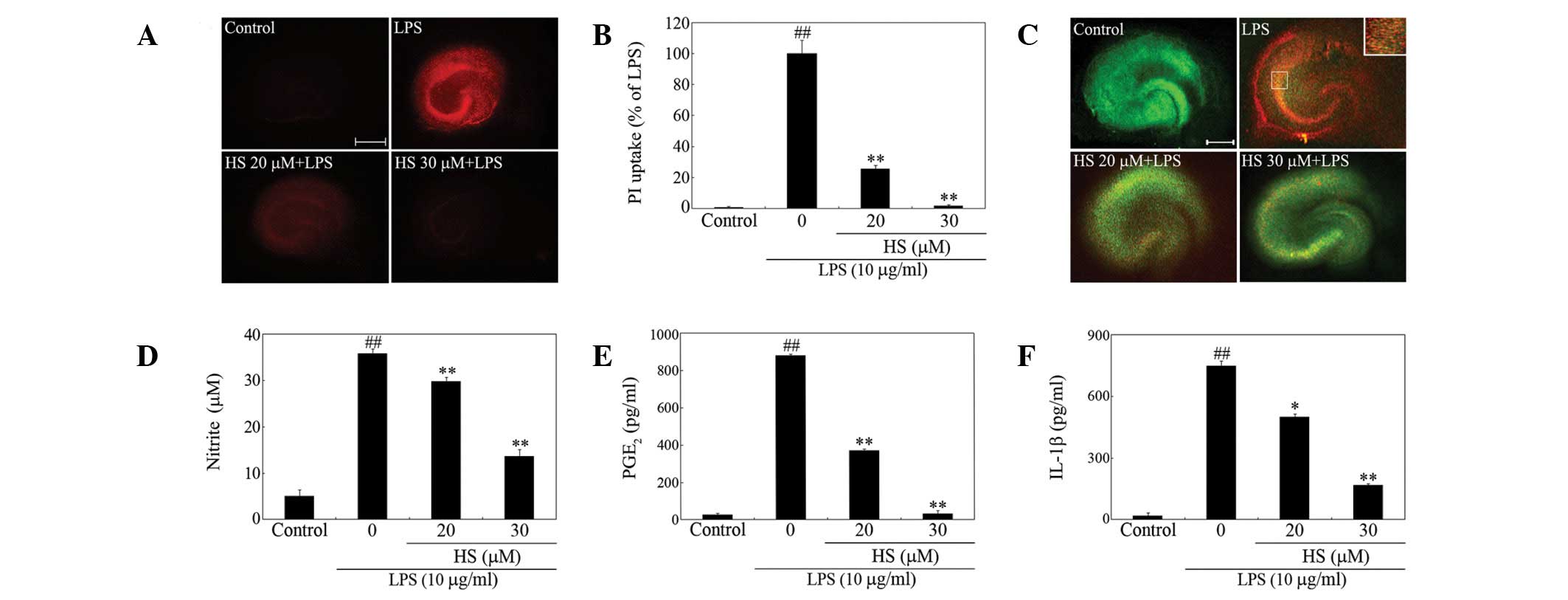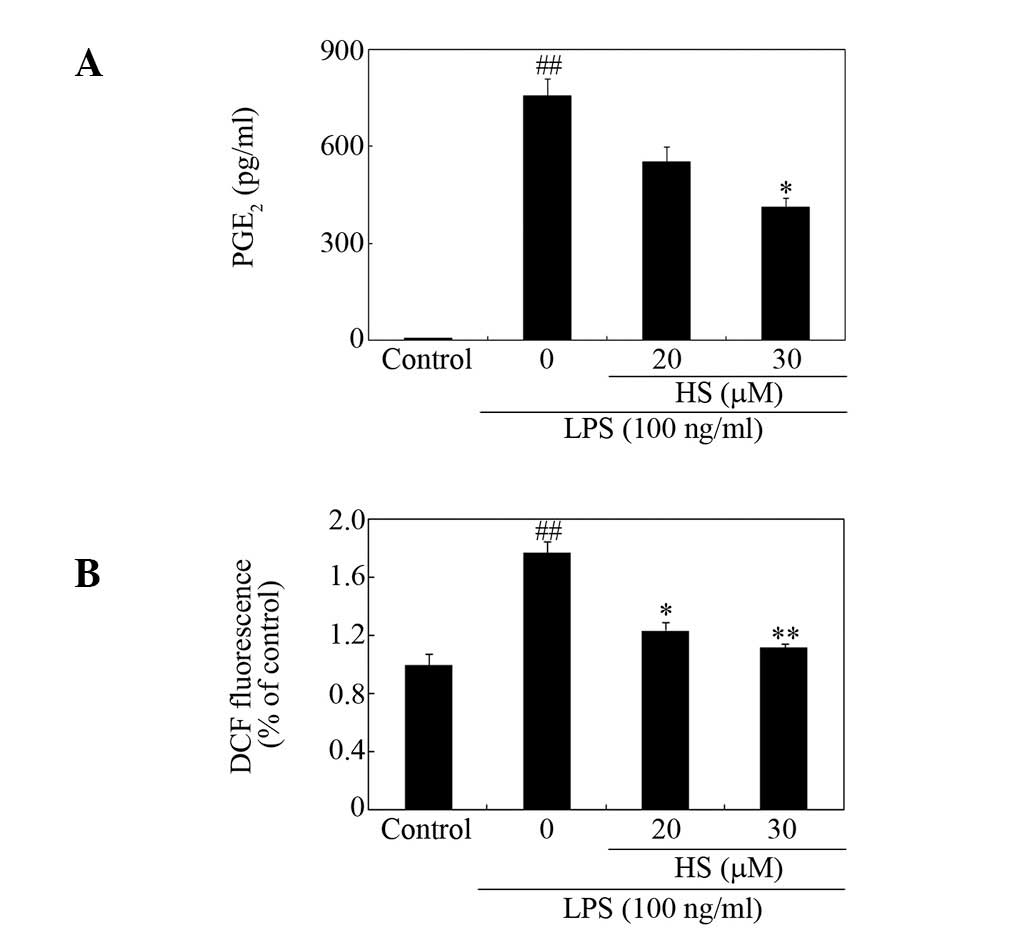|
1
|
Hanisch UK and Kettenmann H: Microglia:
active sensor and versatile effector cells in the normal and
pathologic brain. Nat Neurosci. 10:1387–1394. 2007. View Article : Google Scholar : PubMed/NCBI
|
|
2
|
Walter L and Neumann H: Role of microglia
in neuronal degeneration and regeneration. Semin Immunopathol.
31:513–525. 2009. View Article : Google Scholar : PubMed/NCBI
|
|
3
|
Sugama S, Takenouchi T, Cho BP, Joh TH,
Hashimoto M and Kitani H: Possible roles of microglial cells for
neurotoxicity in clinical neurodegenerative diseases and
experimental animal models. Inflamm Allergy Drug Targets.
8:277–284. 2009. View Article : Google Scholar : PubMed/NCBI
|
|
4
|
Skaper SD: The brain as a target for
inflammatory processes and neuroprotective strategies. Ann NY Acad
Sci. 1122:23–34. 2007. View Article : Google Scholar : PubMed/NCBI
|
|
5
|
Ehrman TM, Barlow DJ and Hylands PJ:
Phytochemical informatics of traditional Chinese medicine and
therapeutic relevance. J Chem Inf Model. 47:2316–2334. 2007.
View Article : Google Scholar : PubMed/NCBI
|
|
6
|
Horie S, Yano S, Aimi N, Sakai S and
Watanabe K: Effects of hirsutine, an antihypertensive indole
alkaloid from Uncaria rhynchophylla, on intracellular
calcium in rat thoracic aorta. Life Sci. 50:491–498. 1992.
View Article : Google Scholar : PubMed/NCBI
|
|
7
|
Masumiya H, Saitoh T, Tanaka Y, Horie S,
Aimi N, Takayama H, Tanaka H and Shigenobu K: Effects of hirsutine
and dihydrocorynantheine on the action potentials of sino-atrial
node, atrium and ventricle. Life Sci. 65:2333–2341. 1999.
View Article : Google Scholar : PubMed/NCBI
|
|
8
|
Wu LX, Gu XF, Zhu YC and Zhu YZ:
Protective effects of novel single compound, hirsutine on hypoxic
neonatal rat cardiomyocytes. Eur J Pharmacol. 650:290–297. 2011.
View Article : Google Scholar : PubMed/NCBI
|
|
9
|
Fujiwara H, Takayama S, Iwasaki K, Tabuchi
M, Yamaguchi T, Sekiguchi K, Ikarashi Y, Kudo Y, Kase Y, Arai H and
Yaegashi N: Yokukansan, a traditional Japanese medicine,
ameliorates memory disturbance and abnormal social interaction with
anti-aggregation effect of cerebral amyoid β proteins in amyloid
precursor protein transgenic mice. Neuroscience. 180:305–313.
2011.PubMed/NCBI
|
|
10
|
Lee J, Son D, Lee P, Kim DK, Shin MC, Jang
MH, Kim CJ, Kim YS, Kim SY and Kim H: Protective effect of methanol
extract Uncaria rhynchophylla against excitotoxicity induced
by N-methyl-d-aspartate in rat hippocampus. J Pharmacol Sci.
92:70–73. 2003.
|
|
11
|
Lee SC, Linh PT, Jing Z, Ryu SY, Myung CS,
Kim YH and Kang JS: Effects of repeated administration of
Uncaria hooks on the acquisition and central neuronal
activities in ethanol-treated mice. J Ethnopharmacol. 94:123–128.
2004.
|
|
12
|
Shim JS, Kim HG, Ju MS, Choi JG, Jeong SY
and Oh MS: Effects of the hook of Uncaria rhynchophylla on
neurotoxiciy in the 6-hydroxydopamin model of Parkinson’s disease.
J Ethnopharmacol. 126:361–365. 2009.
|
|
13
|
Tang NY, Liu CH, Su SY, Jan YM, Hsieh CT,
Cheng CY, Shyu WC and Hsieh CL: Uncaria rhynchophylla (Miq)
Jack plays a role in neuronal protection in kainic acid-treated
rats. Am J Chin Med. 38:251–263. 2010. View Article : Google Scholar
|
|
14
|
Kawakami Z, Kanno H, Ikarashi Y and Kase
Y: Yokukansan, a kampo medicine, protects against glutamate
cytotoxicity due to oxidative stress in PC12 cells. J
Ethnopharmacol. 134:74–81. 2011. View Article : Google Scholar : PubMed/NCBI
|
|
15
|
Shimada Y, Goto H, Itoh T, Sakakibara I,
Kubo M, Sasaki H and Terasawa K: Evaluation of the protective
effects of alkaloids isolated from the hooks and stems of
Uncaria sinensis on glutamate-induced neuronal death in
cultured cerebellar granule cells from rats. J Pharm Pharmacol.
51:715–722. 1999. View Article : Google Scholar : PubMed/NCBI
|
|
16
|
Stoppini L, Buchs PA and Muller D: A
simple method for organotypic cultures of nervous tissue. J
Neurosci Methods. 37:173–182. 1991. View Article : Google Scholar : PubMed/NCBI
|
|
17
|
You JM, Yun SJ, Nam KN, Kang C, Won R and
Lee EH: Mechanism of glucocorticoid-induced oxidative stress in rat
hippocampal slice cultures. Can J Physiol Pharmacol. 87:440–447.
2009. View
Article : Google Scholar : PubMed/NCBI
|
|
18
|
Vornov JJ, Tasker RC and Park J:
Neurotoxicity of acute glutamate transport blockade depends on
coactivation of both NMDA and AMPA/kainate receptors in organotypic
hippocampal cultures. Exp Neurol. 133:7–17. 1995. View Article : Google Scholar : PubMed/NCBI
|
|
19
|
McCarthy KD and de Vellis J: Preparation
of separate astroglial and oligodendroglial cell cultures from rat
cerebral tissue. J Cell Biol. 85:890–902. 1980. View Article : Google Scholar : PubMed/NCBI
|
|
20
|
Nam KN, Son MS, Park JH and Lee EH:
Shikonins attenuate microglial inflammatory responses by inhibition
of ERK, Akt and NF-kappaB: neuroprotective implications.
Neuropharmacology. 55:819–825. 2008. View Article : Google Scholar : PubMed/NCBI
|
|
21
|
Nam KN, Choi YS, Jung HJ, Park GH, Park
JM, Moon SK, Cho KH, Kang C, Kang I, Oh MS and Lee EH: Genipin
inhibits the inflammatory response of rat brain microglial cells.
Int Immunopharmacol. 10:493–499. 2010. View Article : Google Scholar : PubMed/NCBI
|
|
22
|
Qin L, Liu Y, Wang T, Wei SJ, Block ML,
Wilson B, Liu B and Hong JS: NADPH oxidase mediates
lipopolysaccharide-induced neurotoxicity and proinflammatory gene
expression in activated microglia. J Biol Chem. 279:1415–1421.
2004. View Article : Google Scholar : PubMed/NCBI
|
|
23
|
Bhat NR, Zhang P, Lee JC and Hogan EL:
Extracellular signal-regulated kinase and p38 subgroups of
mitogen-activated protein kinases regulate inducible nitric oxide
synthase and tumor necrosis factor-alpha gene expression in
endotoxin-stimulated primary glial cultures. J Neurosci.
18:1633–1641. 1998.
|
|
24
|
Jones BW, Heldwein KA, Means TK, Saukkonen
JJ and Fenton MJ: Differential roles of toll-like receptors in the
elicitation of proinflammatory responses by macrophages. Ann Rheum
Dis. 60:6–12. 2001.PubMed/NCBI
|
|
25
|
Koistinaho M and Koistinaho J: Role of p38
and p44/42 mitogen-activated protein kinases in microglia. Glia.
40:175–183. 2002. View Article : Google Scholar : PubMed/NCBI
|
|
26
|
Lee YG, Lee J, Byeon SE, Yoo DS, Kim MH,
Lee SY and Cho JY: Functional role of Akt in macrophage-mediated
innate immunity. Front Biosci. 16:517–530. 2011. View Article : Google Scholar : PubMed/NCBI
|
|
27
|
Yuan D, Ma B, Wu C, Yang J, Zhang L, Liu
S, Wu L and Kano Y: Alkaloids from the leaves of Uncaria
rhynchophylla and their inhibitory activity and NO production
in lipopolysaccharide-activated microglia. J Nat Prod.
71:1271–1274. 2008.
|
|
28
|
Yuan D, Ma B, Yang J, Xie Y, Wang L, Zhang
L, Kano Y and Wu C: Anti-inflammatory effects of rhynchophylline
and isorhynchophylline in mouse N9 microglial cells and the
molecular mechanism. Int Immunopharmacol. 9:1549–1554. 2009.
View Article : Google Scholar : PubMed/NCBI
|
|
29
|
Hsieh CL, Tang NY, Chiang SY, Hsieh CT and
Lin JG: Anticonvulsive and free radical scavenging actions of two
herbs, Uncaria rhynchophylla (Miq) Jack and Gastrodia
elata Bl, in kainic acid-treated rats. Life Sci. 65:2071–2082.
1999. View Article : Google Scholar : PubMed/NCBI
|
|
30
|
Nakazawa K, Watano T, Ohara-Imaizumi M,
Inoue K, Fujimori K, Ozaki Y, Harada M and Takanaka A: Inhibition
of ion channels by hirsutine in rat pheochromocytoma cells. Jpn J
Pharmacol. 57:507–515. 1991. View Article : Google Scholar : PubMed/NCBI
|
|
31
|
Yang ZD, Duan DZ, Du J, Yang MJ, Li S and
Yao XJ: Geissoschizine methyl ether, a corynanthean-type indole
alkaloid from Uncaria rhynchophylla as a potential
acetylcholinesterase inhibitor. Nat Prod Res. 26:22–28. 2012.
View Article : Google Scholar : PubMed/NCBI
|
|
32
|
Matsumoto K, Morishige R, Murakami Y,
Tohda M, Takayama H, Sakakibara I and Watanabe H: Suppressive
effects of isorhynchophylline on 5-HT2A receptor function in the
brain: behavioural and electrophysiological studies. Eur J
Pharmacol. 517:191–199. 2005. View Article : Google Scholar : PubMed/NCBI
|
|
33
|
Lee P, Lee J, Kim S, Lee MS, Yagita H, Kim
SY, Kim H and Suk K: NO as an autocrine mediator in the apoptosis
of activated microglial cells: correlation between activation and
apoptosis of microglial cells. Brain Res. 892:380–385. 2001.
View Article : Google Scholar : PubMed/NCBI
|


















